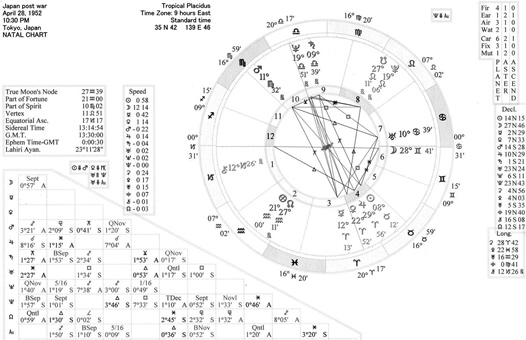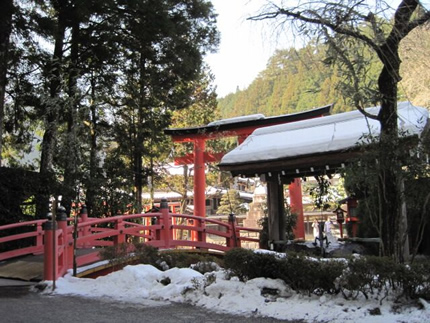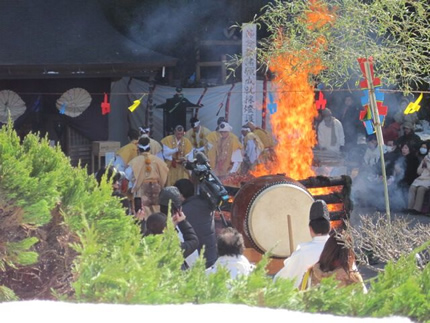IC as our spiritual root : Shinto, Japanese ancient religion"
Yukiko Harwood

Japan's national chart
When I think of Japan's society, I consider the Japan New Constitution chart. (the 28th April 1952, pm10:30, Tokyo) It seems to me that this chart describes Japan's foot print after the Second World War very well.
Firstly, the Sun is in Taurus in the 4th house. What does Aphrodite in Taurian fertile land dream of? Perhaps, she seeks for abundance, security and stability. I think the Japanese basically have the ability to appreciate the beauty of nature created by distinctive four seasons.
However, if this Aphrodite can not be content with abundance given by nature, she might try to fulfill her emotional needs by material possessions and the position in society.
Secondly, Ascendant is in Capricorn. This depicts society's hierarchical system and diligence to climb up a ladder to the top of financial growth.
Although three planets, Venus, Mercury and Jupiter, are in Aries, a fire sign, the earthy nature to give shape to ideas and to make them happen seems to be highly emphasized in this horoscope.
Then, Neptune in Libra right on MC may suggest Japan's yearning for a peaceful world without wars. In fact, Japan has abolished armed force after the Second World War. The country may have caught a glimpse of god's vision of peace and amity. Moreover, what is precious for Neptune in Libra is harmony and to sacrifice ourselves to something larger than us.
Pluto in Leo in the 8th house describes what was engraved in national psyche at that moment. It suggests Japan's tremendous vitality to start from zero after the war. At the same time, an incurable psychological wound caused by two atomic bombs and the defeat might have sunk into the unconscious.
I think that one should be aware and honest as much as possible when one is faced with planets in the 8th house as they are invisible in deeper psyche. If one tries to keep burying the intense feelings of rage and humiliation symbolized by Plutonian disruption, one could be impulsively driven to control or defeat others as a distorted form of compensation.
In addition, this Pluto is in square to Mars in Scorpio in the 10th house. In spite of the fact that Japan has given up armed force, I get the impression that the country has been struggling and fighting under the name of economic growth.
In this chart, Uranus in the 7th house seems to be a difficult planet to communicate with. When one comes across planetary gods in the 7th house, one might feel as if they were other's attributes. Particularly, if the nature of planets in the 7th house is far from the Sun's point of view, one may perceive that they are not his /hers. In other words, when one is faced with something undeveloped in psyche, one could have ambivalent feelings of idealization, envy and hatred. If one sees Uranus in Cancer in the 7th house from Taurian Sun's point of view, how one feels about it?

Uranian projection onto the US after the Second World War
After the Second World War, especially in the mid 1960s, American TV shows flew into Japan. We were dazzled by brand new cars, big refrigerators and glamorous women in nice dresses. It seems to me that we, the Japanese, idealized the US as a gigantic entity symbolized by the Statue of Liberty and a rich country sustained by modern technology and capitalism.
Japan has been making a tremendous effort to develop new technology to follow the US and working so hard to realize American dreams. Uranus in the 7th house may look so shocking in the eye of Taurian Sun in the 4th house. To put it another way, all sorts of Uranian attributes, liberty, individuality, independence and new technology, could have been projected onto the US after the Second World War. Although Japan has achieved a great technological advancement, it seems to me that the Uranian spirit of individuality and freedom was not cultivated well in national psyche.
I personally think that Japanese culture and mentality are highly coloured by Neptune. We, the Japanese, have a tendency to merge into something larger than us and to victimize ourselves for the tribe and whole not to exclude from them .In addition, rigid hierarchichal system may have been dominant throughout history.
Besides, Taurian Sun in the 4th house needs stability and safety, and may not be good at dealing with radical changes and leaping into the unknown.
As a result, Japan's psyche seemed to split into two parts. One side yearns for the sense of home and belonging, and the other side strives after competitive financial, growth. The more the society seeks for rich, modern life, the more people feel suffocated and exhausted.
Then, the earthquake occurred on the 11th March 2011. At the moment of earthquake, four planetary gods including the Sun and Uranus got together in the 8th house. Needless to say, the 8th house theme, death and rebirth, is emphasized. Moreover, Pluto is in the 8th house in Japan's national chart.
Media says that Japan will quickly recover from the severe damage. The country is getting through the period of death and rebirth, but I am questioning myself what the definition of rebirth is. Does it mean building more and more nuclear power plants for industry, and working harder and harder to stregthen economy?


IC as our root : Shinto, Japanese ancient religion
Since Japan's national chart has the Sun in Taurus in the 4th house, I would like to contemplate the meaning of IC. We see IC as our root, home, and parents and the place where we came from and return after death. IC as our root sounds mysterious and enchanting, but what is the definition of "root"? How can we acknowledge the planets close to IC and in the 4th house and receive massages from those planetary gods?
Generally, our view of life is unconsciously built up by our father's view and his life. His life could have been shaped by his father's view and social back ground in those days. If we trace back our family trees, we will come across an enormous amount of rage and resentment caused by power struggles among family members and society's upheavals. If we are not taken over by fury and depression carried from age to age, and manage to get through the unpurified realm of psyche, we will successfully reach the very bottom, which is stored with the ancestral legacy of wisdom and tranquility.
This realm seems to be the root, IC. That sounds like the 12th house's matter, but I see the 12th house as the global unconscious storehouse. On the other hand, IC, the cusp of the 4th house, depicts the way how we could realize our tribal inheritance which gives us the sense of nourishment, protection and guidance.
When I was in Japan, I used to visit a small shrine named "Tenkawa", which means the Milky Way, in a remote village in Nara. In fact, the head priest had never asked me if I were a Shintoist, Buddhist or Christian. He always accepted me to join the rituals without asking anything. Actually, he accepts anyone. Young musicians often take part in their religious rituals and sometimes, the rituals are held with Shinto mantra and techno music. Surprisingly, they go very well together.
Although I have visited there for more than twenty times, I knew nothing about the origin, history and philosophy of "Shinto", Japanese ancient religion, so I bought a book of Shinto.
The book says that Shinto is a natural religion born and nourished in Japan. Shinto has no founder, no doctrines, no idols and no commandments. The Japanese had believed the power of the spiritual dimension can make contact with human beings through trees. Human beings, animals, plants and all nature matter are the offspring of the great original god called KAMI. Shinto does not possess a clear definition of sin. Each individual must transcend through repentance.
Then I came across an interesting description.
Beyond death, one is said to go to "Ne-no kuni", the land of root. It is the place where the soul-spirit receives eternal life, and the place where every new life is regenerated.
Root implies the source that gives birth to everything. The ancient Japanese had the image of "the land" as a place across the ocean. The ancients viewed the universe as consisting of both visible and invisible world. Our material world mirrors the hidden world, the land of root from which everything has emerged, and every existence is the mirrored embodiment of the spirit, KAMI. It has been widely believed in Japan that ancestral spirits exist in the invisible world, overlapping with physical reality and having intimate connection with people living in the material world.
Interestingly, every single depiction sounds very Neptunian to me. I guess that we, the Japanese, do not have a concrete boundary between the visible and invisible world.
Thus, we naturally have an ability to pick up invisible vibration around us and to merge into something larger and greater than us. The ancients may have been able to tune into the godlike spirit in nature and believed in "Ne-no kuni", the land of root, which gave them the inner base of life and total trust towards death.


